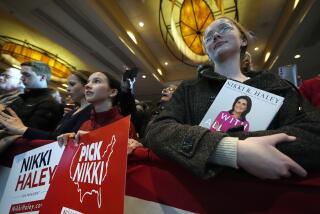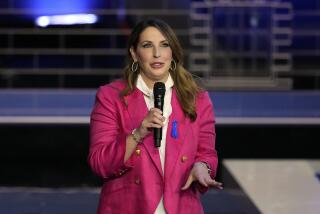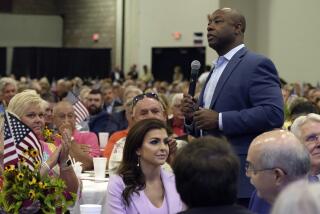Bush, Quayle Warn GOP of Danger in Divided Party : Republicans: Appeals for unity address a challenge from the right but avoid a direct attack on Buchanan.
- Share via
CHARLESTON, S.C. — Moving to undercut the challenge that has surfaced on their political right, President Bush and his running mate warned Republicans on Friday of the long-term dangers of leaving the party divided.
In separate campaign appearances, Bush and Vice President Dan Quayle continued to avoid direct attacks on GOP rival Patrick J. Buchanan, whose candidacy has shown surprising early strength.
But Bush, speaking to a conference of Southern Republican leaders in Charleston, appealed to his audience to “keep our party strong and united so we can win this fall.”
In blunter terms, Quayle delivered a similar message in Washington to a convention of conservative groups that Buchanan had addressed Thursday. The vice president painted a bleak picture of a liberal Democratic Administration that he warned would take power unless Republicans join ranks behind Bush’s reelection effort.
“Anyone has the right to wage a symbolic campaign,” Quayle said at the annual Conservative Political Action Conference. “But it would be irresponsible to endanger all that we have achieved” since Ronald Reagan was elected President in 1980 and Bush succeeded him in 1988.
Quayle detailed the White House’s bedrock argument against Buchanan’s campaign: By voting for the conservative commentator in the primaries in order to “send a message” of complaint to Bush, disenchanted Republicans are only softening the President for possible defeat in November and, in the end, helping the Democrats.
Indeed, Bush senior adviser Charles Black said the long-range campaign calls for the vice president to “talk about what life would be like under a Democratic President.”
In his speech, Quayle said, “The only real question facing us today is whether our President will enter the general election campaign from a position of strength, or from a position of weakness.”
The approach allowed Quayle to try to take on the Buchanan phenomenon without alienating Buchanan supporters or directly criticizing the candidate.
He painted a picture that was intended to portray the frightening prospect of a Cabinet appointed by a Democratic President: Kate Michelman, an abortion rights leader, as secretary of Health and Human Services; Rep. Patricia Schroeder (D-Colo.), a frequent Pentagon critic, as defense secretary; former President Jimmy Carter as secretary of state, and consumer advocate Ralph Nader as attorney general.
“Let’s not allow our movement to be divided,” Quayle said. “Let’s not allow ourselves to play into the hands of those who wish to weaken the President of the United States--the liberal Democrats.”
The comments by Bush and Quayle reflected mounting White House apprehension that a prolonged Buchanan insurgency could jeopardize their chances for victory in the fall. But their statements also reflected the anxious indecision of a Bush camp that is still uncertain about the wisdom of attacking their rival directly.
A senior adviser to Bush said Friday that the campaign had “served notice” that it was prepared to strike back if Buchanan continues his attacks on the President as the campaign moves to the South, the site of several primaries in the next few weeks.
But as they continued to nurse wounds from Tuesday’s New Hampshire primary, in which Bush won 53% of the vote, senior advisers to the President were to gather at the White House today to begin what some officials described as a reassessment of campaign strategy.
“Is our message right?” one official said. “That’s what this is all about.”
The strategy session, to include campaign chairman Robert M. Teeter, campaign manager Frederick V. Malek and other top officials, will allow the group to “sit down and kind of talk about where we are and where we’re going,” White House Chief of Staff Samuel K. Skinner said.
Bush advisers remained divided about the seriousness of the Buchanan threat, with some officials regarding him as no more than a passing nuisance.
Malek told reporters aboard Air Force One that Buchanan had “hit his high-water mark” in New Hampshire and would not fare nearly as well in future primaries. But he declined to say by what margin he thought Bush would win the March 3 primary in Georgia, a contest for which Buchanan plans a major effort.
In his speech in Charleston, Bush underlined the importance of the South to his political future.
“Four years ago the South led our party to a great victory across the entire country and this year the South will lead us to victory in November, 1992,” he said.
Bush also vowed to veto a Democratic economic growth package that is being pushed as an alternative to his own economic proposals. “If the Democrats send me this nonsense they’re talking about now,” he said, “I will send it right back. I will veto it.”
As Bush spoke, Buchanan was at a news conference across the street, claiming that he had been denied a chance to appear before the gathering. But South Carolina Gov. Carroll A. Campbell Jr., the Bush campaign’s regional chairman in the South, insisted that Buchanan had been offered his own slot--on Sunday.
While Bush did not mention Buchanan by name, he continued his bid indirectly to “define” his opponent by scorning as “naive” the America-first foreign policy that his rival promotes.
Advisers said Bush’s visit to South Carolina may be the only one he makes to the state before the March 7 Republican primary. The campaign is relying on a powerful Republican organization headed by Campbell to provide a decisive victory over Buchanan and former Ku Klux Klan leader David Duke.
“South Carolina eliminated Pat Robertson,” Campbell said in an interview. “South Carolina eliminated Bob Dole. It’d be fun for us to eliminate a couple more right here.”
Quayle began his campaign day at a news conference in Marietta, Ga., where he toured a sprawling Lockheed Aerospace Co. plant where the F-22 fighter jet will be built.
The vice president touched on the theme he would spell out later in his speech in Washington, saying, “What the liberal Democrats really want is for the conservative movement to be articulate, effective, influential and out of power.”
In an effort to solidify the Administration’s ties to the political right, Quayle brought with him Rep. Newt Gingrich (R-Ga.), one of the more conservative members of Congress, who represents the district bordering the plant. And, seeking to appeal to a sports-minded constituency, he gave Atlanta Braves baseball player David Justice a ride to Marietta aboard Air Force Two.
More to Read
Get the L.A. Times Politics newsletter
Deeply reported insights into legislation, politics and policy from Sacramento, Washington and beyond. In your inbox twice per week.
You may occasionally receive promotional content from the Los Angeles Times.










